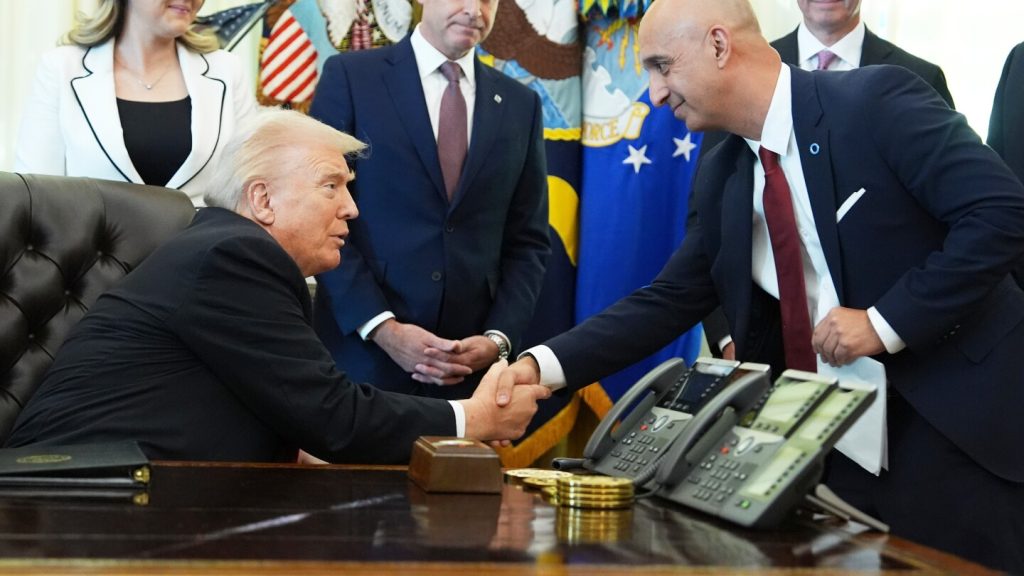Listen to the article
President Trump Strikes Deal to Expand Access to Popular Weight-Loss Drugs
President Donald Trump announced Thursday a landmark agreement with pharmaceutical giants Eli Lilly and Novo Nordisk to reduce prices and expand coverage for their blockbuster weight-loss medications Zepbound and Wegovy.
The deal aims to make these increasingly popular GLP-1 receptor agonist drugs more accessible to millions of Americans struggling with obesity. Currently priced at around $500 monthly for higher doses, these medications have remained out of reach for many patients due to their cost and inconsistent insurance coverage.
“This will save lives, improve the health of millions and millions of Americans,” Trump said during an Oval Office announcement, where he referred to the medications as “fat drugs.”
Under the agreement, Medicare will begin covering these drugs for obesity treatment starting in 2025 – a significant shift in policy. The program will cover the medications for people with severe obesity and those who are overweight with serious health conditions. Qualifying patients will face $50 copayments.
For those without insurance coverage, the administration’s TrumpRx program will enable direct purchases from manufacturers beginning in January. Officials stated the average price through this program will initially be around $350, gradually decreasing to $245 over two years.
Eli Lilly has committed to selling starter doses of Zepbound for $299 monthly and additional doses for up to $449 – reductions of $50 from current direct-to-patient prices. Novo Nordisk declined to provide specific details about their pricing changes.
The deal also includes provisions for more affordable options through Medicaid programs. Additionally, if new oral versions of these treatments receive regulatory approval, their starting doses would cost $149 monthly.
Thursday’s announcement represents the Trump administration’s latest effort to address soaring drug prices amid broader cost-of-living concerns among voters. Earlier this year, Pfizer and AstraZeneca agreed to lower prescription drug costs for Medicaid following a May executive order.
GLP-1 drugs work by targeting hormones in the gut and brain that regulate appetite and fullness. Clinical trials have shown they can help patients lose 15% to 22% of their body weight – up to 50 pounds or more in many cases. However, patients typically need to continue these treatments indefinitely or risk regaining weight.
These medications have been exceptionally profitable for their manufacturers. Lilly recently reported that sales of Zepbound have tripled this year to more than $9 billion.
Health and Human Services Secretary Robert F. Kennedy Jr., who previously expressed skepticism about GLP-1 drugs, praised the deal at Thursday’s announcement. “Trump is the friend of the forgotten American,” Kennedy said. “Obesity is a disease of poverty. And overwhelmingly, these drugs have only been available for people who have wealth.”
However, CDC data shows obesity rates are actually slightly higher among middle-income Americans than those with the lowest and highest incomes.
The timing of this announcement follows Democrats’ success in recent elections across the country, where economic concerns dominated voter priorities according to AP polling data. The administration appears eager to demonstrate Trump’s engagement with Americans’ frustrations over rising costs for necessities including healthcare.
Dr. Leslie Golden, an obesity medicine specialist in Wisconsin, emphasized the critical need for improved access to these medications. She noted that among her approximately 600 patients taking GLP-1 drugs, at least 75% struggle with affordability. Even those with insurance coverage sometimes face $150 copayments for refills.
“Every visit it’s, ‘How long can we continue to do this? What’s the plan if I can’t continue?'” Golden said. “Some of them are working additional jobs or delaying retirement so they can continue to pay for it.”
In a related development, U.S. health regulators on Thursday agreed to expedite review of Lilly’s obesity pill, orforglipron. A decision on Novo Nordisk’s Wegovy pill is expected later this year. These oral formulations could potentially make treatment more convenient and accessible for patients if approved.
Federal estimates indicate more than 100 million American adults suffer from obesity, highlighting the potential public health impact of expanded access to these medications.
Fact Checker
Verify the accuracy of this article using The Disinformation Commission analysis and real-time sources.




9 Comments
Expanding access to obesity treatments is a positive step, but ensuring long-term health outcomes and addressing root causes of the obesity epidemic is crucial. Curious to see how this impacts the pharmaceutical industry and costs for patients.
Agreed, the challenge will be balancing affordability with quality of care. Hopeful this leads to more holistic approaches to tackling obesity.
The Trump administration’s move to lower costs and increase access to obesity drugs is noteworthy. However, addressing the root causes and broader societal factors driving the obesity epidemic should be the priority.
Interesting move by the Trump administration to negotiate lower costs for these weight-loss drugs. Curious to see how this affects the broader pharmaceutical industry and if it sets a precedent for other high-cost medications.
Yes, this could be a significant policy shift. Will be interesting to monitor the impacts and unintended consequences, if any.
This is an interesting development, though the details will be important. Curious to see how the new policy impacts patient access, drug costs, and the broader pharmaceutical landscape.
Expanding coverage for obesity treatments is a positive step, but the sustainability and unintended consequences of this deal will be crucial to monitor. Hopeful it leads to more affordable and accessible options for patients.
While expanded access to obesity treatments is welcome, I’m skeptical this alone will be enough to meaningfully address the public health crisis. Holistic approaches targeting root causes and societal factors are crucial.
Agreed, a comprehensive strategy is needed. Lowering costs is a start, but long-term solutions must consider lifestyle, environment, and systemic change.